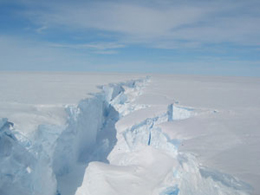
Advancing our understanding of how the oceans melt Antarctic ice shelves, and quantifying present and future Antarctic Ice Sheet mass loss and its contribution to sea-level rise.
Objectives are:
This research will result in an effective national response to sea level rise and other climate change impacts, based on improved knowledge of how the Antarctic Ice Sheet and sea level responds to climate change.
Another significant outcome will be a national capability in multi-disciplinary investigations of ocean – ice shelf interaction. This will include innovative and cost-effective observing systems for on-ice and under-ice measurements and numerical models equipped to project future change.
In the 2014-15 summer, an Antarctic Gateway Partnership expedition to the Totten and Mertz Glaciers measured ocean currents and water properties near the front of each glacier from the Aurora Australis with new profiling floats and the first-ever deployment of an acoustically-navigated glider in the East Antarctic.
Interested in working with this team? PhD Scholarships available now.